One of the best feelings after a shower is grabbing a big towel to wrap around yourself, but that feeling can be ruined if your towel isn't very soft. If you're wondering how to soften your towels, you're in the right place! We have researched and scoured the internet for solutions for softening your towels, including without a dryer. We have five ways below!
You can soften your towels by:
- using hot water
- using fabric softener
- white vinegar
- baking soda
- changing how you dry them (including without using a dryer!)
That's quite a few options, so how do you choose which one to try first? Well, keep reading as we discuss each of the methods below, and you can decide for yourself which one is the best option for you. We'll also answer some other questions you might have regarding your towels!
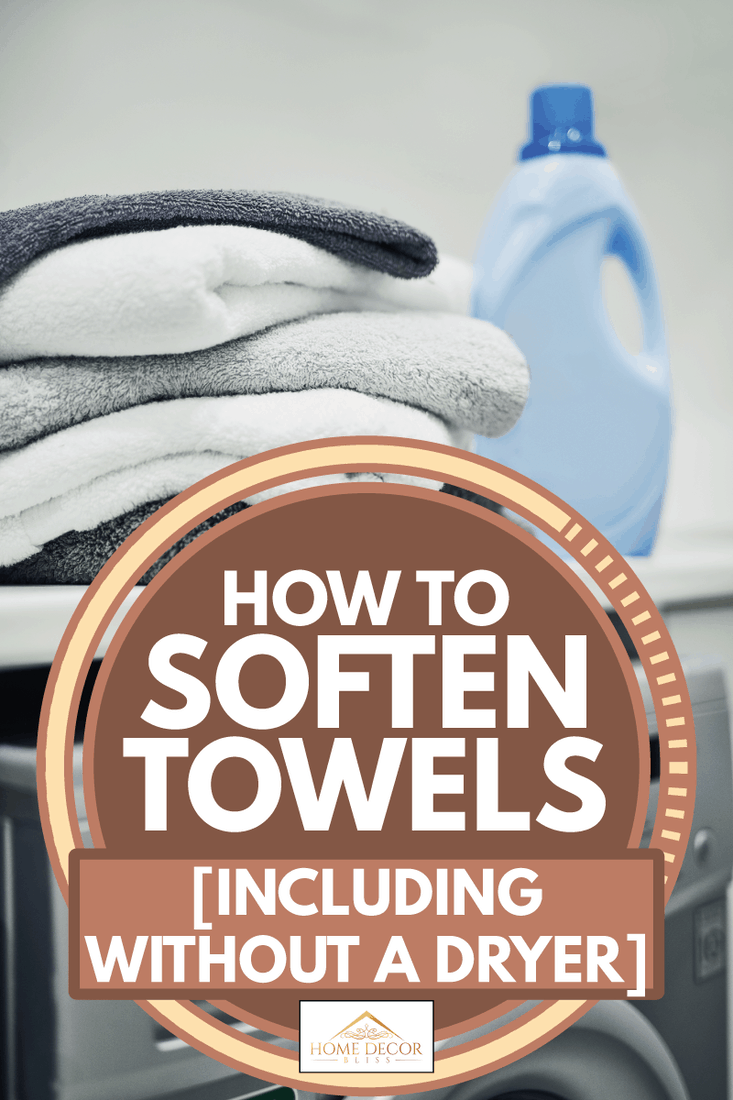
1. Using Hot Water
Just changing the temperature that you wash your towels in can help soften them up. Hot or warm water can help break down any leftover oils or residual detergent. If you have bright colored towels, keep in mind that hot water can contribute to color fading, and if you want to keep them bright, you should try one of our other softening methods.
What Is The Best Setting To Wash Towels?
We sometimes add affiliate links and content that was curated and created by our team with the help of advanced ai tools to help showcase the best design styles.
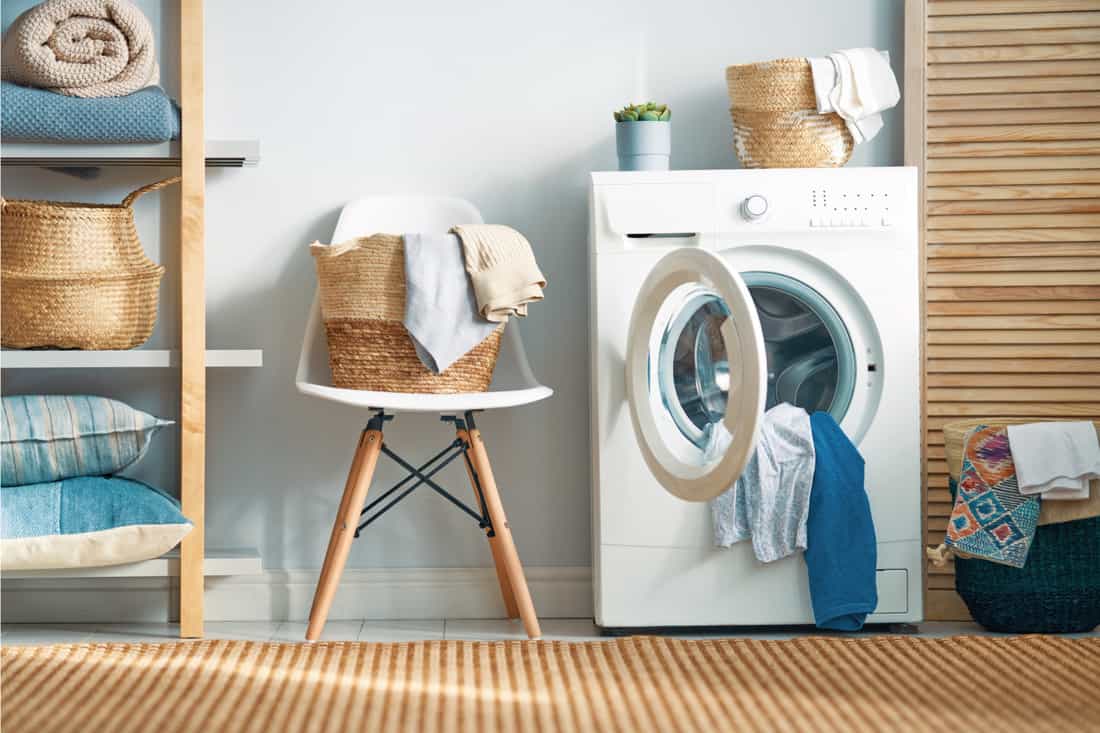
If your washer does not have a 'towel' setting, it is recommended you wash your towels in hot or warm water. For light or white towels, use hot water. As mentioned above, colors can fade with hot water, so for brighter, more colorful towels, use a warm setting.
Using an 'automatic' or normal cycle will work fine as far as speed and soil settings are concerned. Remember it is best to wash towels separately, with like colors, and try not to overfill your load.
2. Using Fabric Softener
Fabric softener might seem like an obvious choice when trying to decide how to soften your towels, and it can definitely help. After all, it does say in its name it's for softening fabrics. It can help soften your towels, but don't be too heavy-handed and think more is better. It is not recommended to add a fabric softener every single time you wash your towels as residue can build up and cause them to harden instead of softening.
Another option is to allow your towels to soak in fabric softener after running them through their regular wash cycle. You can do this by placing your towels in a large container such as your bathtub. Let them soak for at least an hour in a solution of one cup of fabric softener and enough hot water to cover your towels. After they have soaked long enough for the fabric softener to saturate them, run them through a rinse cycle in your washer.
What Is The Best Fabric Softener For Towels?
As mentioned above, using a fabric softener too frequently can actually be more harmful than helpful when it comes to your towels, but Bounce fabric softener is highly recommended as one of the best overall softeners. A fabric softener that is cheaper and less damaging to towels is white vinegar. We have more information on using white vinegar as a softener below.
Click here to see Bounce Fabric Softener Sheets on Amazon.
3. White Vinegar
White vinegar is known for its multipurpose uses in the cleaning world, so it may or may not be a surprise that it can come in handy when doing your towel laundry. Use 1/2-cup to 1-cup of white vinegar in place of your detergent or fabric softener. White vinegar helps strip the towels of any leftover residue, such as detergent from previous washes or oils from previous uses.
You should use this method to clean your towels approximately every six weeks. If your towels smell of vinegar after this wash, run a second cycle with a small amount of detergent. Fresh air and sunshine will also help eliminate the vinegar scent, so if you have a way to hang your towels outside to dry, you can do that too.
Click here to see Shine Vinegar on Amazon.
4. Baking Soda
Like white vinegar, baking soda is also a popular cleaning agent. Using baking soda to help soften your towels can be done with just baking soda alone or, for best results, combined with the method above. You can use 1/2-cup of baking soda mixed in with your regular detergent to soften your towels, or you can run another wash cycle with 1/2-cup of baking soda and hot water after washing with white vinegar.
5. Changing How You Dry Your Towels
Consider changing the way you dry your towels whether you use a dryer or not. We can sometimes be tempted to dry items on a higher heat in hopes of them drying faster, but high heat can damage and harden our towels.
Dryer
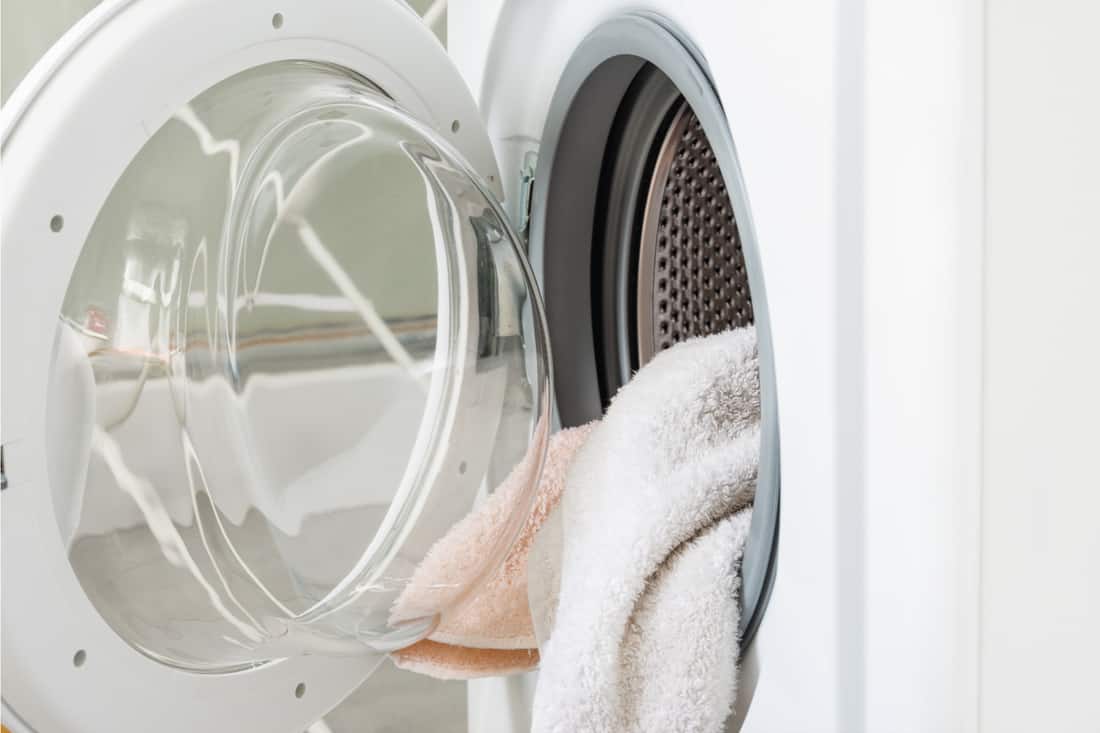
To help soften your towels, try drying them on a lower heat. You can also try adding dryer sheets or dryer balls. Be mindful that, like fabric softener, dryer sheets can also leave residue behind on your laundry and the inside of your dryer.
Dryer balls are great because they are reusable. Clean tennis balls can also be used if you don't have dryer balls. They might add a little noise to your dryer as they bounce, but they'll pound the towels as they do and help prevent stiffness when they come out of the dryer.
Click here to see SnugPad Wool Dryer Balls on Amazon.
Hanging Them To Dry
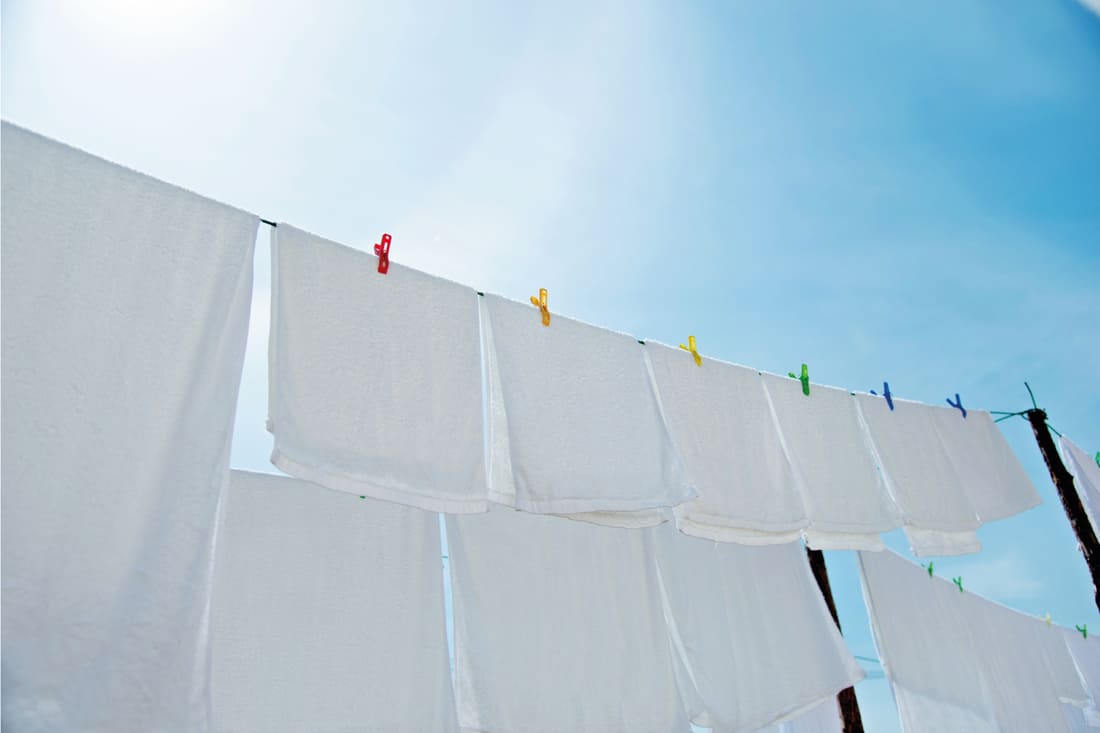
Try hanging your towels outside to dry. A slightly breezy, not too hot day would be ideal, but drying your towels outside, even on a warm day, won't be as harsh as using a dryer. Once they are dry, shake and massage your towels to help soften them up and remove any stiffness.
If you don't have anywhere to hang your towels outside, you can hang them inside; just make sure they have plenty of space between each one. For faster drying, place them near a vent or a fan. If it's something you decide to do regularly, you may want to consider buying a rack to hang your clothes on.
Click here to see Home-it Clothes Drying Rack on Amazon.
For tips on how to fold your towels after drying, check out our blog on "How To Properly Fold Towels (5 Ways You Should Know)."
How Do You Keep Towels From Getting Hard After Washing?
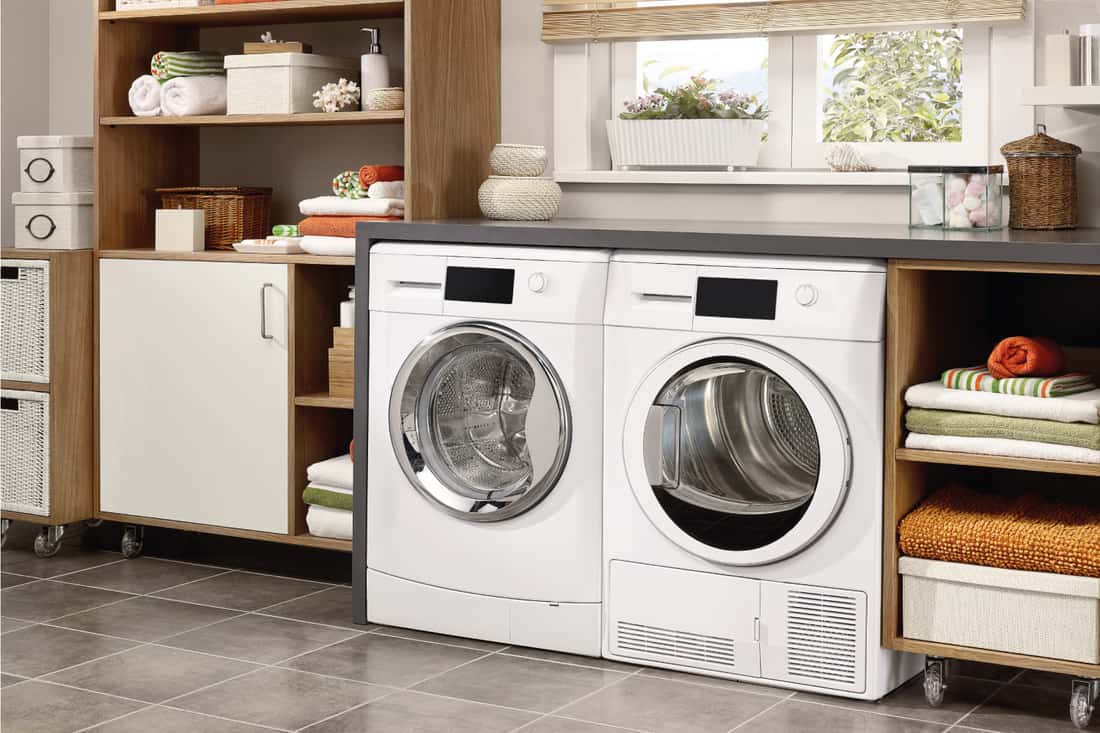
Before you dry your towels, twist and then shake them out as you take them out of the washer. This helps loosen them up and can help prevent them from twisting in the dryer. Do the same thing after they come out of the dryer to help keep your towels fluffy.
Using less detergent in your washer can also help prevent them from getting hard. A little goes a long way! Too much detergent can leave a residual film and make your towels stiff.
Doing smaller loads of laundry can also help. Do not overfill your washer with towels. They need room to get clean. If you have a large load of towels to clean, consider splitting them into smaller loads!
How Do Hotels Keep Their Towels So White And Soft?
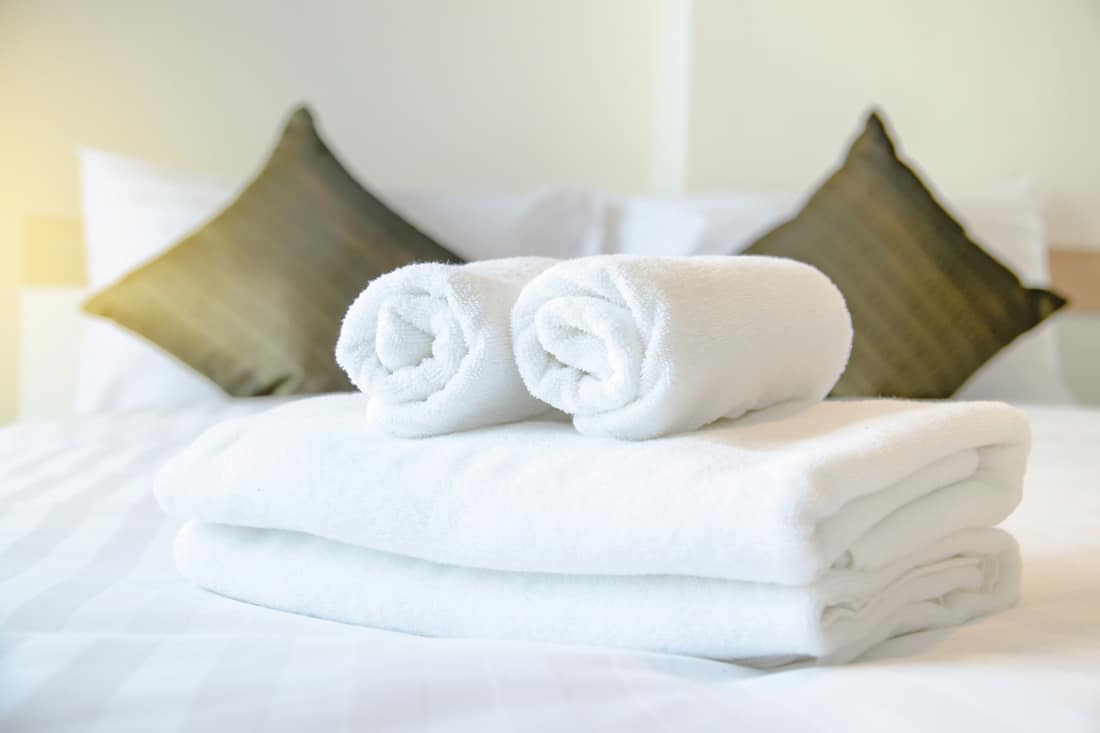
You may have noticed that towels in hotel rooms are almost always white, along with their sheets and bedding. Though this does help with the appearance of luxury, it also has a practical reason. All of the towels and linens can be washed together.
One of the reasons they can keep them so white is because they wash them with only white items. This is not their only trick. Most hotels will pre-treat any stains and also invest in high-end washers to help get them extra clean. Some hotels will also follow some of the tricks above and use vinegar and baking soda to help treat their towels.
Final Thoughts
We've given you five different ways to soften your towels! You can try one, or you can try them all, but hopefully, you'll be on your way to having softer towels in no time, and wrapping up after the shower will be comfy once again!
For more reading about towels, visit "Bath Sheet Vs. Bath Towel: What’s The Difference?"




